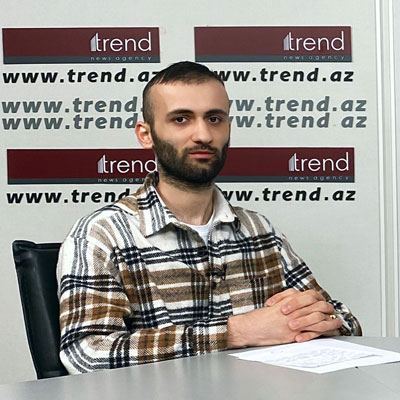BAKU, Azerbaijan, February 11. Against the backdrop of geopolitical changes in Europe, which also affect the wider region, the world is facing challenges in all economic sectors, including transport.
Traditional transport and logistics chains are being disrupted, thus making it necessary to use alternative, safer, and efficient routes. The most optimal option for Eurasia are routes passing through Azerbaijan, located at the junction of the North-South and East-West corridors.
In particular, significance of the Middle Corridor, or Trans-Caspian International Transport Route (TITR), in which Azerbaijan plays a crucial role, is growing. The Corridor is a multilateral institutional development linking China’s rail freight transport networks and the EU through Central Asia, the Caucasus, Türkiye, and Eastern Europe. There are few routes linking Europe to Central Asia, and at the moment, the Middle Corridor offers the shortest and least expensive route to Europe.
In this context, considering the rising global interest in Azerbaijan's cargo transportation, expansion of the throughput capacity of the Port of Baku is very relevant.
As President of Azerbaijan Ilham Aliyev said at a plenary meeting on “Eurasia’s Middle Corridor: From Pathway to Highway” held as part of the World Economic Forum in Davos (Switzerland) on January 19, 2023, the Baku International Sea Port with a capacity of 15 million tons will be expanded up to 25 million tons, and already a budget has been allocated for that. A growing number of cargoes are expected, in particular due to the difficulties of transportation through traditional routes.
“We have already seen the diversion of a large number of cargoes from Central Asia, and this is only the beginning. Also, I'd like to add that starting from this year, we started to transit oil from Kazakhstan, not only from Turkmenistan, which has been taking place for many years, with the potential to use this corridor for hydrocarbons too. Therefore, I think that we now need to have closer cooperation between all the countries involved – Central Asia, Caucasus and Europe – in order to work actively on customs administration, to have more or less a 'single window' approach and on tariffs policy. Because we need to make this route not only attractive from the point of view of absence of other routes, but attractive commercially,” President Ilham Aliyev said.
The master plan for the second phase of the Port of Baku is being prepared by the Dutch Royal HaskoningDHV company. It is expected to be ready by mid-2023.
Given that the Port of Baku transshipped over 6.3 million tons of cargo, which speaks of a growth of 14 percent compared to 2021, it's scheduled to build a terminal for loading/unloading and further transportation of block trains, as well as to construct a multi-modal logistics terminal that will perform transport replacement, packing/unpacking of goods, and a number of other logistics operations.
This terminal is expected to play a key role in implementing the existing and future transshipment potential of the port. In addition, at the end of 2022, nearly 52,300 TEU containers were handled, which was 16 percent more than in 2021. The stable growth in container numbers proves the need for the medium and long-term construction of a larger container terminal (with increased capacity from 100,000 to 500,000 TEU).
Further speaking of the Port's activity - the rise in handling of heavy trucks (TIRs) amounted to 31 percent (over 51,514 trucks). The number of transshipped passenger cars tripled. Moreover, for the first time in the last three years, in 2022, the transshipment of rail cars has increased. This growth amounted to 27 percent – up to 38,700 rail cars.
It needs to be added that transit cargo comprises 90 percent of the overall cargo transported through Azerbaijan.
Kazakhstan, Uzbekistan, and Turkmenistan have big production potential (about 10 million tons per year) and are important exporters of mineral fertilizers. In this regard, Azerbaijan has already reached preliminary agreements to have these countries transport their goods through Azerbaijan and further to the EU countries. The construction of a mineral fertilizer handling terminal is currently underway. The transshipment capacity of the new terminal is going to amount to 2.5 million tons per year. Furthermore, construction of a grain terminal is also expected in the short term.
Azerbaijan plans also to bring additional 60,000 TIRs to the Port of Baku as part of its cooperation with Turkish Albayrak Group. For more efficient transshipment of these vehicles, and the construction of a TIR part is expected for their efficient transshipment.
On July 15, 2022, Chairman of the Albayrak Group Ahmet Albayrak and Director General of Baku International Sea Trade Port Taleh Ziyadov signed the first public-private cooperation agreement. As part of the agreement, Albayrak will invest in construction and management of the bulk cargo terminal of the Baku Port, as well as in the management of the Ro-Ro terminal in order to redirect Turkish wheeled vehicles from Central Asia to Azerbaijan.
Thus, the port's capacity is expected to reach 25 million tons and 500,000 TEU containers per year.
Azerbaijan continues to invest in transport infrastructure (roads and railways, in particular) and is restoring the historical connection of the region. The development of transport networks will lead to economic growth not only for Azerbaijan, but also for the neighboring countries.
The transport network created by Azerbaijan is closely connected with other routes and corridors that have a significant impact on the development of international trade and the creation of a new supply chain. In this regard, the role of the Zangazur corridor becomes of major importance. With the opening of this corridor, the time of cargo transshipment from China to Europe is going to be reduced to two weeks, new markets for Azerbaijan are going to open, including transit to Africa, and the cost of cargo transportation is expected to decrease as well.






